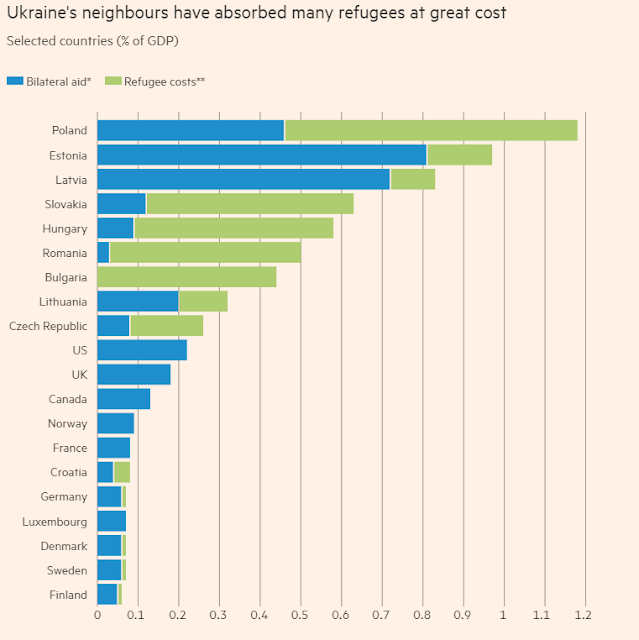For a decade and a half here we have yelled, begged, pleaded for Continental European NATO - especially Germany - to rise to the challenge of the 21st Century and pull their fair share of the load to keep peace in Europe.
I have warned even longer IRL until it has become tiresome that they do not realize that the American public is just one election away from shrugging being Europe's security blanket. Everything regresses to the mean, and at our heart we are a mercantile republic, not an empire. WWII and the Cold War warped the nature of our relationship with Europe, and the force of regressing back to our natural state will bring us back across the Atlantic and looking to our West for the future unless the Europeans take concrete steps to encourage us not to.
Many in Europe, especially their natsec "elite" who think they know they USA because the read WaPo, NYT, and The Economist - have visited DC and lived a semester in Boston, etc, delude themselves to think Trump was an outlier. He was a warning, not a temporary PITA.
Few things will wear an American's patience thinner than a repeated refusal by someone to do their fair share of the work; to pay their fair share of the cost; to bear their fair share of the burden.
Especially when our efforts benefit others who refuse to make an honest effort themselves - our charity only lasts so long.
No other nation has benefited more from being under the American security umbrella for so long than Germany, and yes, I will focus on her. I focus on her because not only has she benefited the most, she is the strongest nation economically in Continental NATO (sorry France), and has the largest population. Culturally as well, she is highly influential to the other medium and small NATO powers in a way others are not.
I am a great fan of Germany, her people, and her culture ... and that is why I expect more from her - to be the nation the West needs her to be in the 3rd decade of the 21st Century. Others will follow her lead either out of admiration, duty, or fear. I don't care - I want a stronger European NATO. It is the only way to keep the Americans in and the Russians out - with apologies to our friend Lord Ismay .
I am not sure if the Germans have thoroughly fooled themselves, or they take everyone else for a fool. Today, the German Embassy sent out a fact sheet dated 10 June that put out in part;
Germany is the third largest arms supplier for Ukraine
- Germany is at the forefront of providing Western military equipment to Ukraine, including advanced and heavy weapons. This includes the most modern anti-artillery radar and one of the most advanced air defense systems. Heavy weapons also include seven “Panzerhaubitze 2000” Howitzers, and 30 “Gepard” air defense tanks. We will also deliver armored multi-rocket launchers. From the beginning of the conflict Germany has provided e.g. thousands of anti-tank missiles, Stinger anti-aircraft missiles, Strela antiaircraft missiles, tens of millions of ammunition, bunker busters, machine guns, anti-tank mines, six-figure amounts of hand grenades and explosive charges as well as more than 170 armored vehicles.
- Germany is facilitating weapon transfers from NATO-partners to Ukraine by supplying partners with advanced weaponry in exchange (“backfilling”) and is greenlighting the supply of weapons that originate from German production or GDR stocks.
- Germany contributed USD 535 million through the European Peace Facility (EPF) that mobilized a total of USD 2.14 billion to support EU member states’ supplies of military equipment to the Ukrainian Armed Forces.
Germany is one of Ukraine’s most important financial supporters
- Within 100 days since the start of Russia’s war of aggression, Germany has bilaterally committed over USD 4 billion to support Ukraine.
- Every fourth Euro in the EU support to Ukraine amounting to USD 4.5 billion so far comes from Germany, over one billion USD in total.
- Germany has also been providing support via the UN. For example, Germany was the largest donor to the UN Central Emergency Response Fund in 2021 and has already provided substantial support in 2022, of which funds are being provided to Ukraine.
- Germany provides political, financial and personnel support to reach accountability for crimes committed in Ukraine. Germany supports the ICC investigation into war crimes during the Russian invasion into Ukraine with over USD 1.1 million.
- Germany also supported Ukraine substantially before Russia´s war of aggression. From 2014 to January 2022 Germany supported Ukraine with over USD 3 billion in direct financial support, including humanitarian assistance and development cooperation. In addition, USD 3.8 billion was provided through the EU. For years, Germany has provided more in humanitarian aid to Ukraine than any other EU state.
Germany is hosting high numbers of Ukrainian refugees
- Every refugee from Ukraine is welcome in Germany. So far, more than 800.000 refugees from Ukraine have been registered in Germany.
OK, let's rack-and-stack this.
I'd like to point you to an information packed article over at FT, with two graphs based on metrics from our friends at the exceptional Kiel Institute;
NB: the EU is not a country ... but if it were it would have both a population greater than the USA (448 million vs 330 million) and GDP 86% of the USA's ($17.9 trillion vs $20.9 trillion). I'll ignore that stupidity on the graph and instead stick to the constituent nations on the graph.
GBR, POL, DEU, FRA, CAN, ITA, and NOR combined have 64.8% of the GDP of the USA ((2.71+.59+3.8+1.64+1.89+.36)=13.6 vs 20.9). If they spent the same to secure their borders as we did, that would be $27.2 billion vs $43 billion. Doing a little estimating based on the above graph, those nations actually spent $14.9 billion. That is 35.4%, not 64.8%.
Again, our allies are freeriding.
Oh, but you say, what about that refugee burden Germany wants you to have the feels about as much as they do? Funny you should mention that; FT has the graph for you.
Hell, even France is doing more than Germany by these metrics. Germany needs to stop lying to itself and its friends. As mentioned before, I am a great friend to Germany - but I will not lie to her when it is my nation's blood and treasure they are riding on - expecting to defend the West to the last Ukrainian, Europe to the last Pole, and Germany to the last American.
Germany is not a child. She should not be patronized. She is one of the most advanced, educated, rich, and financially stable nations on this planet. This is their backyard. They need to step up - other nations will follow...like they are right now in her sloth.
Keep this up and they should not be shocked when the next election across the Atlantic combines with the economic trials many of us see coming and brings the NATO alliance to a place they won't know what to do.
Pull your weight. Support the Ukrainians. Support the smaller Central European nations. You have to lead as you refuse to effectively follow and are too big to get out of the way.
There is a lot of work to do.
Help make the 21st Century be what it can be, or you may find the Americans letting you suffer to the east again as you did in the 20th Century as America focuses on the new center of power - Asia.

























